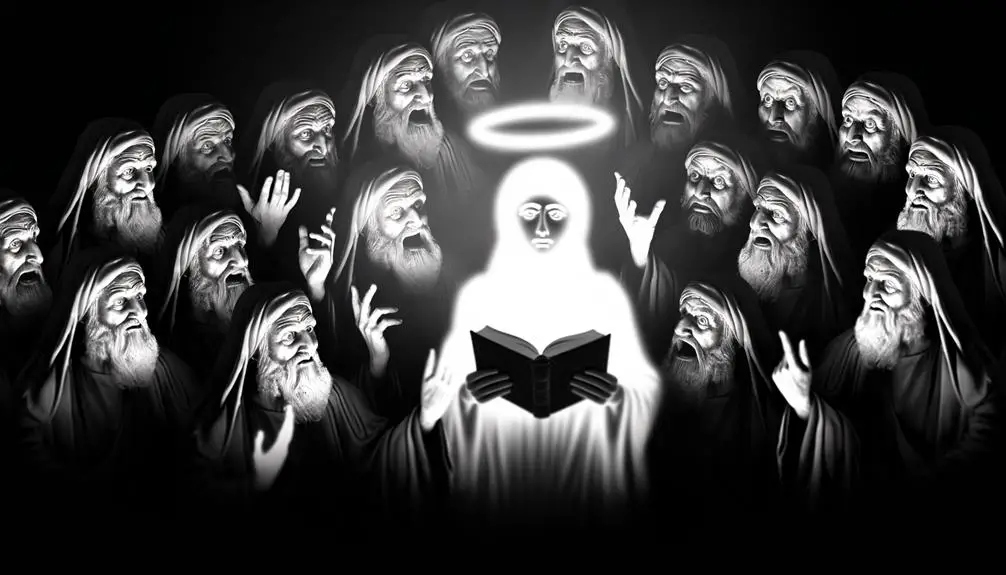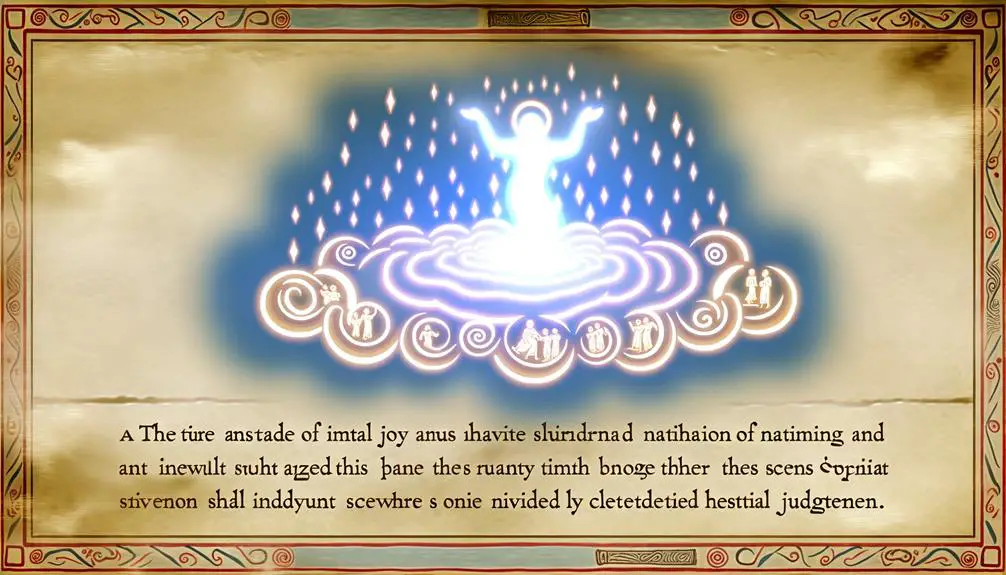Journey through biblical narratives to uncover the profound meanings behind derision, revealing lessons on human folly and divine judgment.

What Does Derision Mean in the Bible
In the tapestry of biblical narratives, derision often emerges as a sharp needle, weaving threads of scorn and mockery through the fabric of divine and human interactions. You'll find that, beyond its surface-level meaning, derision in the Bible carries weighty implications, serving as both a mirror to human folly and a shadow of divine judgment.
As you explore its presence in the Old and New Testaments, you'll uncover layers of meaning that challenge the notion of derision as mere mockery. What lessons can you draw from these ancient texts, and how do they resonate with today's understanding of respect and reverence? The answers lie in a closer examination of biblical passages, where the concept of derision unfolds in unexpected ways.
Key Takeaways
- Derision in the Bible signifies mocking or ridicule, often reflecting contempt or disdain.
- Biblical derision encompasses divine laughter, prophetic mockery, and scorn from enemies.
- Mocking God or His prophets results in severe consequences, highlighting the dangers of disrespect.
- Jesus' experience with derision includes mockery from religious leaders, crowds, and Roman soldiers.
Defining Derision Biblically

In biblical context, 'derision' often signifies mocking or ridicule directed towards individuals or groups, reflecting a deep disdain or contempt. This concept isn't just a fleeting moment of mockery but encompasses a broader societal or individual attitude of scorn, deeply rooted in historical and cultural contexts. The origins of derision in biblical times can be traced back to conflicts, differences in belief systems, and the human tendency to assert dominance or superiority over others. This form of belittlement served not only as a psychological weapon but also as a means of social control, reinforcing hierarchies and discouraging dissent.
Analyzing derision's origins in biblical narratives offers a lens through which to examine its modern parallels. Today, you see derision manifesting in various forms of media, politics, and everyday interactions, often under the guise of humor or critique. Yet, the underlying intent and effect remain strikingly similar to its ancient counterparts. It's used to marginalize, silence, or discredit individuals or groups, perpetuating a cycle of exclusion and inequality.
Understanding the biblical concept of derision, therefore, isn't an antiquated exercise but a critical tool in recognizing and addressing its contemporary manifestations. By drawing parallels between historical instances of derision and its modern equivalents, you're better equipped to identify and challenge the subtle ways in which it infiltrates societal discourse and behavior. This analysis not only enriches your comprehension of biblical texts but also enhances your awareness of the dynamics of power, control, and resistance in today's world.
Derision in the Old Testament

The Old Testament is replete with examples of derision, showcasing how this form of mockery and contempt played a crucial role in the narratives and dynamics of ancient societies. You'll find that derision wasn't only a common reaction to the failings or misfortunes of others but also a tool used by prophets and psalmists to deliver divine messages of rebuke and correction. The use of derision in the Old Testament serves as a lens through which one can better understand the cultural and religious contexts of the times.
Here are four vivid examples to illustrate this:
- Psalm ridicule: In Psalms, the psalmist often employs ridicule against the enemies of God, underlining their folly in opposing the divine will. For instance, Psalm 2:4 describes how the one enthroned in heaven laughs; the Lord scoffs at them. This imagery of divine laughter serves as a powerful reminder of the ultimate futility of human defiance against God.
- Prophetic mockery: Prophets like Elijah used mockery as a tool to challenge the prophets of Baal (1 Kings 18:27). Elijah's sarcastic challenge highlights the impotence of the false gods and underscores the power of the true God.
- Enemies' scorn: Israel's enemies often used derision as a weapon to demoralize and frighten the people of God (Nehemiah 4:1-3). This external scorn tested the faith and resolve of God's people.
- Divine derision: God Himself is depicted as mocking those who oppose Him, emphasizing His sovereignty and the foolishness of rebellion against Him.
Analyzing these instances, it's clear that derision in the Old Testament is multifaceted, serving both as a form of social commentary and divine judgment.
Derision in the New Testament

In the New Testament, derision plays a significant role in the narrative, particularly through the experiences of Jesus. He encounters mockery and scorn, not just from societal elites but also from the general populace, reflecting a broader theme of rejection.
This analysis will explore how these instances of derision, especially through parables, contribute to the text's deeper meanings and the portrayal of Jesus' mission.
Jesus Faces Mockery
Throughout the New Testament, Jesus frequently encounters mockery and derision from various groups, illustrating a profound aspect of his ministry and the societal challenges he faced. This treatment towards Jesus provides insight into the cultural context of his time and sheds light on the emotional impact such derision had.
- Religious leaders questioning his authority, undermining his teachings.
- Crowds doubting his miracles, attributing them to other sources.
- Roman soldiers mocking his claim to kingship, placing a crown of thorns on his head.
- Passersby scoffing at him on the cross, challenging him to save himself.
Analyzing these instances reveals not just the societal tensions of the era but also underscores the resilience and steadfastness of Jesus in the face of scorn.
Parables and Scorn
Jesus's use of parables often met with scorn from those who either couldn't grasp their meanings or rejected the truths they unveiled. This derision not only highlights the spiritual blindness of the detractors but also underscores the cultural and societal divides of the time.
Modern interpretations of these biblical narratives further illuminate the depth of scorn faced by Jesus, emphasizing the importance of understanding the cultural context in which these stories were told. Scholars argue that recognizing the historical and cultural nuances of first-century Judea is crucial for a comprehensive understanding of the parables' significance.
This approach allows you to appreciate the layers of meaning and the reasons behind the scorn, offering a richer insight into the New Testament's teachings on derision.
Examples of Divine Derision

While exploring the concept of divine derision in the Bible, one finds that God often employs mockery to underline the folly of opposing His will. This theological nuance reveals a dimension of divine communication that's both profound and impactful, illustrating the consequences of defying the sovereign authority of the Creator. The Scriptures provide numerous instances where divine derision is manifested, particularly towards mocking prophets and scoffing nations, embodying the futility of human arrogance against God's plans.
- Mocking Prophets: In the book of 1 Kings, the prophet Elijah confronts the prophets of Baal on Mount Carmel. He mockingly suggests that their god might be sleeping or busy, highlighting the impotence of Baal in comparison to the omnipotence of Yahweh. This episode serves as a stark reminder of the divine disdain for false prophets and their deceptive practices.
- Scoffing Nations: Psalms 2 presents a vivid depiction of God's reaction to rebellious nations. The psalmist describes how God laughs at and derides the nations that conspire against His anointed, emphasizing the futility of their plots.
- The Tower of Babel: In Genesis, humanity's attempt to build a tower to the heavens is met with divine derision, as God confuses their language, scattering them across the earth. This story illustrates the folly of human pride and the limits of human ambition.
- Pharaoh's Defiance: Exodus recounts how Pharaoh's refusal to free the Israelites incurs God's mockery, manifested through a series of plagues that expose the Egyptian gods' powerlessness. This narrative underscores the dangers of challenging divine authority.
These examples encapsulate the theme of divine derision in the Bible, serving as cautionary tales that underscore the peril of opposing God's will.
Consequences of Mocking God

Mocking God's sovereignty triggers profound consequences, as biblical narratives consistently demonstrate. This principle isn't just a relic of ancient texts but finds modern parallels in societal impacts today. When you examine the repercussions of disregarding divine authority throughout biblical history, a pattern emerges—where divinely guided order is mocked, chaos often follows. This chaos isn't limited to spiritual ramifications but extends to societal breakdowns, highlighting the interconnectedness of spiritual attitudes and communal welfare.
Delving deeper, you'll find that mocking God often leads to a hardening of the heart, a condition that not only estranges individuals from divine guidance but also fosters a culture of insensitivity and moral decline. This spiritual ailment, mirrored in modern contexts, can manifest as societal issues—ranging from widespread injustice to the erosion of communal bonds. The biblical narratives serve as cautionary tales, suggesting that a society's departure from divine principles can precipitate its downfall.
Furthermore, the act of mocking God is depicted as inviting divine judgment, not merely as an expression of divine retribution but as a corrective measure, aimed at realigning societal values and priorities. This concept resonates with contemporary challenges, where societal crises often prompt a reevaluation of ethical standards and a return to foundational moral principles.
Lessons From Biblical Derision

Exploring biblical derision offers valuable insights into how these ancient narratives can guide contemporary understanding and behavior. The Bible, rich in its depiction of mockery and scorn, not only reflects the cultural interpretations of its time but also sets the stage for understanding modern parallels. Through careful analysis, you can discern several key lessons:
- The Power of Words: Biblical accounts emphasize the impact of derision on individuals and communities. This underscores the modern notion that words can build or destroy, resonate or repel, making it crucial to wield them with care and empathy.
- The Role of Humility: Many biblical stories where derision occurs highlight the virtue of humility. They suggest that true strength lies not in belittling others but in maintaining humility, a lesson that remains profoundly relevant in today's often competitive and ego-driven society.
- Consequences of Disrespect: The narratives vividly illustrate the negative outcomes of mocking what's sacred or esteemed. This serves as a cautionary tale against the disregard for what others hold dear, advocating for mutual respect in diverse cultural landscapes.
- Empathy and Understanding: Finally, these stories encourage empathy by putting oneself in the shoes of those subjected to derision. Understanding the pain that mockery can inflict fosters a more compassionate and inclusive community.
Frequently Asked Questions
How Has the Interpretation of Derision in the Bible Changed Over Time Across Different Christian Denominations?
Over time, the interpretation of derision across Christian denominations has evolved due to translation challenges and shifting cultural contexts.
You've seen scholars grapple with ancient languages and societal norms to accurately convey meanings that resonate with contemporary audiences.
This evolution reflects a deeper understanding of scripture, as translators and theologians work to bridge the gap between historical texts and modern values, ensuring that interpretations remain relevant and accessible to you today.
Are There Any Parables or Stories Outside the Canonical Bible That Reflect the Theme of Derision Similarly, Perhaps in the Apocrypha or Pseudepigrapha?
Yes, you'll find themes of derision in texts outside the canonical Bible, especially in Gnostic texts and Wisdom literature.
For instance, the Wisdom of Solomon, part of the Apocrypha, reflects on the righteous being mocked by the wicked, paralleling the derision seen in canonical scriptures.
This literature offers a deeper understanding of how early Christians and Jews perceived scorn and mockery, analyzing it through a scholarly and analytical lens.
How Do Modern Theologians Reconcile the Concept of Divine Derision With the Teaching of Love and Forgiveness in Christianity?
You're exploring how modern theologians understand divine derision alongside love and forgiveness in Christianity. They often frame this reconciliation through divine empathy and forgiveness dynamics, analyzing scriptural contexts where divine derision occurs.
Scholars argue that divine empathy allows for understanding human frailty, while forgiveness dynamics emphasize God's overarching love and mercy. This approach supports a balance, showing that divine derision can coexist with, and even underscore, the teachings of love and forgiveness.
In What Ways Has the Concept of Derision in the Bible Influenced Christian Art, Literature, and Music Throughout History?
You've noticed that derision in the Bible has deeply influenced Christian art, literature, and music through history. Artistic symbolism often captures these themes, reflecting the complex emotions and moral lessons.
Musical adaptations, from classical compositions to modern hymns, weave narratives of derision into melodies, enriching the spiritual experience. This interplay between derision and creativity showcases how artists and musicians interpret biblical teachings, infusing their works with layered meanings and messages.
Can the Act of Derision Be Viewed Positively in Any Context Within the Bible, Such as in the Form of Prophetic Critique or Righteous Indignation?
You're exploring whether mocking prophets or employing sarcastic wisdom can be positively interpreted, such as in prophetic critique or righteous indignation.
This approach suggests that derision doesn't purely signify disrespect or scorn. Instead, when used strategically, it can serve as a tool for moral or spiritual correction, highlighting societal or individual flaws through sharp critique.
This nuanced perspective challenges the conventional understanding of derision, presenting it as a potential catalyst for reflection and change.
Conclusion
In conclusion, derision in the Bible underscores a profound lesson: mocking God or His ways invites dire consequences.
For instance, consider the Babylonians who, in their arrogance, scoffed at divine warnings, only to face downfall.
This biblical theme serves as a timeless reminder that treating the sacred with contempt isn't only foolhardy but also spiritually perilous.
Through these narratives, Scripture emphasizes the gravity of reverence towards the divine, urging readers to reflect on their own attitudes and behaviors.



Sign up